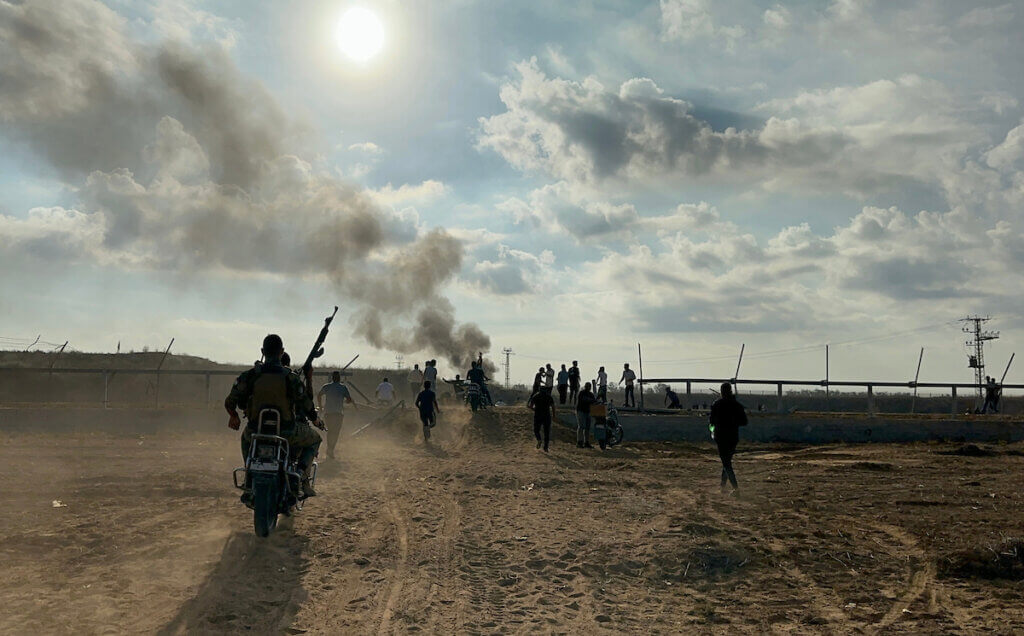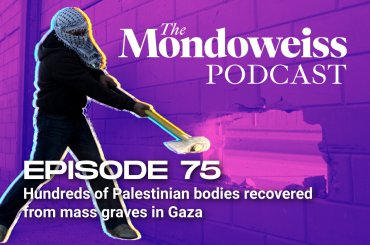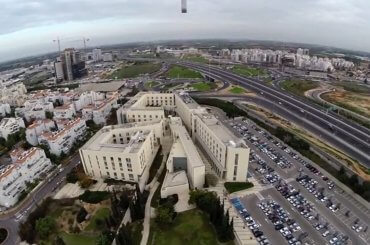Editor’s Note: The following article is by a Palestinian reporter based in Palestine who requested anonymity due to fear of Israeli repression.
The deadly military operation launched by Hamas fighters from Gaza on October 7 has shocked Israeli settler society. But it is not only Israelis who are baffled: many supporters of Palestinian liberation around the world also found themselves struggling to make sense of these events and unsure what stance they should take. Only once Israel began its intense onslaught on Gaza, killing tens of thousands of Palestinians, did the moral line become clear once again to many, and the full wave of solidarity return.
While this support is vital at a time when Gaza is facing genocide, it is instructive to analyze the context in which global support rallied behind the Palestinians. It would appear that many of Palestine’s supporters are more comfortable when Palestinians are perceived as mere passive victims of Israel’s colonial rule. This was not the situation on October 7, when, for the first time in years, the marginalized refugees of the Gaza Strip fought back on such a large scale within their lands occupied by Israel in 1948. This action caused much intellectual confusion, even among those in solidarity with Palestinians, that still needs clearing up.
While the details of what transpired on October 7 are still coming to light, what is known is that hundreds of Palestinian fighters broke out of Gaza under the cover of rocket fire and opened fire on settlers— civilians, soldiers, and police alike. Subsequent media reports continue to uncover that some of these casualties were a result of Israeli air and ground attacks, but the overall Israeli death toll on the day has surpassed 1,100.
The abundance of gruesome images of violence, combined with the unprecedented number of Israeli casualties, raised questions for some on the colonized’s use of violence in the struggle for liberation. Some have wondered why civilians seemed to be targeted and or why residential neighborhoods were invaded. Others have questioned why the operation took place inside “Israel proper” rather than limiting itself to the “occupied territory,” using this false dichotomy to question resistance to colonialism.
This article is not necessarily meant to defend the actions taken during the recent Palestinian attack but rather to place them within a contextualized anti-colonial perspective. This is especially important for those in the Palestine solidarity movement who cannot afford to shy away from the complexities of settler colonialism and the violent struggles for liberation from it.
Breaking a false dichotomy
Too often, Gaza is viewed only in the context of being the world’s largest open-air prison — a besieged enclave where some 2 million Palestinians are sealed off. The strip, together with the West Bank, is also considered part of the “occupied Palestinian Territory” captured by Israel in 1967. This understanding often separates these parts of Palestine from what is often considered “Israel proper” or the areas occupied during the Nakba. This understanding normalizes and masks Israel’s colonial nature and origins going back to -at least- 1948.
Based on this reasoning, unlike the “settlers” in the 1967 territories, Israelis living in the lands occupied in 1948 -such as those who are based around Gaza- are viewed as uninvolved and external to the conflict. Palestinians in Gaza or the West Bank, or refugees in the diaspora, are, in the same vein, also often perceived as extraneous to the parts of their homeland stolen in 1948.
This perspective ignores the long past of ethnic cleansing that culminated in the 1948 Nakba and the dispossession of Palestinians from the vast majority of Mandatory Palestine, including its Gaza district, in which tens of villages were erased off the face of the earth.
Israel’s leaders have understood this since the Nakba.
In 1956, then-IDF Chief of Staff Moshe Dayan — who would later serve as Israel’s defense minister — read a eulogy at the grave of an Israeli who was killed by Palestinians who crossed from Gaza. “We must not place blame with the murderers,” he said. “How can we possibly blame them for their dire hatred for us? For eight years they’ve sat in the refugee camps in Gaza, and right before their eyes we make the lands and villages in which they and their forefathers dwelled into our estate.”
Today, the Gaza Strip is now home to refugees from these villages and towns, and from other areas in Palestine, including where the Tel Aviv settlement stands today, whose homes and property were robbed by Israel. Refugees make up around 80 percent of Gaza’s population, originating from +190 depopulated locations all over Mandatory Palestine, all besieged within 140 square miles. Since 1948, Israel has denied the return of Palestinian refugees to their homes and lands, while freely allowing Jews from around the globe to obtain Israeli citizenship and take their place. Palestinian refugees’ land has been taken over by Israeli settlers, who sometimes even live in the very same houses that belonged to Palestinians.
And indeed, Palestinians in Gaza do not see the fence that imprisons them as a “border with Israel”, but as a barrier that separates them from their colonized lands and stolen villages, caging them in the refugee camps. In addition, Gaza refugees do not view Israelis living in settlements built on top of the ruins of their villages as mere uninvolved civilians. Rather, they see them as settlers— a main pillar of a classic case of settler colonialism such as the one in Algeria and South Africa.
In 2018 and 2019, Israeli snipers shot dead hundreds of Gazans who protested at the fence during the weekly Great March of Return. The very use of the word “return” as their slogan reflects Palestinians’ wish not just to lift the siege but to return to and reclaim their lost homeland and dismantle the concentration camp for refugees that has been constructed in the Gaza Strip.
A new fall for the Israeli “left”
Following October 7, large swaths of the so-called Israeli left, even including those who identify as “anti-Zionist” or “anti-colonialist”, once again fell into the trap of comparing the actions of Palestinians with those of their Israeli colonizer. Some denounced Palestinian violence in the same vein as the systemic state and state-sponsored violence perpetrated against Palestinians, setting aside the power disparity between the colonizer and the colonized. This discourse portrays a worldview divorced from history, in which Israel is not a settler society, and the towns and cities built on land stolen in 1948 are understood outside the context of settler colonialism.
This discourse ignores that Palestinians in the Gaza ghetto, the West Bank, and the 1948 territories live at the edge of the fate they were robbed of, with their old homes within eyesight. In addition, within this discourse, Israelis are never perceived as making an active choice to participate in the settler project — they simply live. The immediate impact and longer-term repercussions of how those lives are enjoyed at the expense of Palestinians are simply non-existent or deemed irrelevant.
Thus, while Palestinians see the act of challenging the false dichotomy of 1948/1967 as liberatory, this logic has no place in the Israeli mind, even within much of the left.
To truly confront this reality means not only theoretically understanding the injustice and power imbalance but also carrying the burden of decolonization and understanding one’s role as part of the settler society. Talk alone, without the required sacrifice to back it up, is cheap. The process of decolonization is not without a cost, and members of the settler society who support it must be willing to truly relinquish the social, political, and material privileges afforded to them for decades and understand that some harm is inevitable in the process of liberation.
Decolonization can be ugly, but the future need not be
Colonialism does not relent — not on its own and not because you ask it nicely. Decolonization is a noble cause, but the path to achieving it is often tainted by violence. This can be observed in cases such as South Africa, Algeria, and Ireland, among others, where a ‘clean decolonization’ did not occur. In the absence of any realistic alternative path to liberation, people are forced into carrying out ugly but necessary acts — a fundamental consequence of the disparity of power. To demand the oppressed always act in the purest of ways is to demand they remain forever in servitude.
The concepts of war crimes or international law are not relevant to subjugated people fighting to dismantle colonial rule while under the boot of a repressive power. These are post-colonial, conflict-resolving tools that are not designed to undo colonialism of the kind we see in Palestine.
It is also important to note that while decolonization is often bloody, Palestinians’ goal is not simply to kill or remove Israeli settlers from Palestine. Hamas charter says the movement strives for the establishment of an Islamic state under which Jews will be permitted to live, and the Palestinian left has called to establish a single democratic state based on justice and equal individual rights for all for decades. Regardless of a political vision, any viable future of true justice for all between the river and the sea must be built upon a struggle to dismantle colonialism and the underlying dynamics that sustain it. For this, it is important when supporting the Palestinian struggle not to limit your support to Palestinian victims alone.
And finally, while a degree of political violence may always required in liberation struggles, we must, above all, remain human for a society of justice to emerge. When boundaries are transgressed, such as killing minors, it should be admitted, but the struggle as a whole, including the use of political violence against the settler society, must not be discounted or condemned. To this end, Palestinians have been heartened to see even some comrade Israeli settlers opposing colonialism and refusing to denounce Hamas but understanding October 7 as a day of resistance. And to the solidarity movement worldwide – Palestinians are urging allies to support Palestinians when they fight, not only when they die.



Part 1: The author states, “The concepts of war crimes or international law are not relevant to subjugated people fighting to dismantle colonial rule while under the boot of a repressive power. These are post-colonial, conflict-resolving tools that are not designed to undo colonialism of the kind we see in Palestine.” This is at best a specious argument, and at worst, a dangerous concept that has no validity in international human rights law, international humanitarian law, the laws of war and Islamic jurisprudence that matters to many of us Palestinians of the Islamic faith. Furthermore, as a former freedom fighter with our struggle, trained in warfare, I find the author’s comments offensive and even harmful to our national struggle that enjoys enormous global support as never before.
The whole point of our Palestinian struggle for liberation is that we fight from the moral high ground of a just cause based on truth, human rights, and international law. Here the author thinks those things are irrelevant to us. It is immaterial that nationalist, anti-colonial struggles in the past made the same mistake of targeting civilians either carelessly or intentionally.
In the film, Lion of the Desert, Omar Al-Mukhtar and his fighters successfully ambush and destroy almost an entire Italian army patrol in the desert. When the young Italian Lieutenant leading the column and two of his surviving soldiers are captured, one of Omar’s men tries to shoot them. Omar stops his fighter, and the fighter says, “they do it to us!” Omar replies by saying firmly, “They are not our teachers!”. Then Omar takes the Italian flag and hands it to the young Italian lieutenant before releasing him and says, “Tell your generals, this flag does not belong here.” We need to follow the very same ethos in battle so we keep the moral high ground on our side.
Part 2: Let us be perfectly honest with ourselves, Palestinians, Arabs, Muslims, and solidarity activists of all backgrounds. What happened on October 7th was nothing more than a slave revolt just like the Nat Turner Rebellion of 1831 and the Haitian Revolution of 1802. The young Hamas fighters who broke through the Gaza fence and pounced on Israel were just like Turner’s combatants and the Neg Marron Inconnus in Haiti. Much ugly violence took place and Turner’s and L’Ouverture’s fighters slaughtered every white person they could lay their hands on.
Yes, the Oct. 7th attack was executed very competently from a military standpoint, although those experienced in warfare believe it limited the military effectiveness of the attack by getting distracted with targeting and taking hostages of civilians, instead of focusing exclusively on Zionist soldiers and war material. This whole debate has been going on in the Palestinian movement for decades and sadly, many but not all our resistance groups have made the mistake of targeting civilians. A notable exception are the resistance brigades in the West Bank that bravely resist Israeli incursions from a defensive posture. They enjoy wide support throughout historic Palestine by their bravery.
Finally, those of us who fight for one democratic, secular Palestinian state with full equality for all, firmly reject the sort of theocratic state and military style dictatorship that Hamas has always strived for. Fatah and the PA are no better except that they adopted a more secular nationalist posture. The point is our movement should create something entirely new and learn from the mistakes of earlier national liberation movements. That is our task for now and the future.
Part 3: To be fair to the author who is living in the Hell created by the Zionist entity, the rest of the article is well argued and makes some very good points. However, I believe the criticism I made is valid and tarnishes the rest of the article. The passage from the article I quoted will surely be noticed by some I fear and used against us. I hope that thinking does not have much currency within our movement and among our Palestinian People because it can and will be used against us and undermines us internally. Again, as our Arab national hero, Omar Al-Mukhtar said, our Zionist adversaries are not our teachers! He also said, “we don’t surrender, we win, or we die (fighting).”
I think this is an excellent article. As a Jewish anti-Zionist I appreciate this paragraph: And finally, while a degree of political violence may always required in liberation struggles, we must, above all, remain human for a society of justice to emerge. When boundaries are transgressed, such as killing minors, it should be admitted, but the struggle as a whole, including the use of political violence against the settler society, must not be discounted or condemned. To this end, Palestinians have been heartened to see even some comrade Israeli settlers opposing colonialism and refusing to denounce Hamas but understanding October 7 as a day of resistance. And to the solidarity movement worldwide – Palestinians are urging allies to support Palestinians when they fight, not only when they die.
A welcome, thoughtful, and reflective article.________________________
“To demand the oppressed always act in the purest of ways is to demand
they remain forever in servitude… Palestinians are urging allies to support Palestinians when they fight, not only when they die.”
____________________________________________________________
This colonialization is unique in important ways. An objective of equal citizenship rights in a shared land entails different approaches than independence does. When strategy is contradictory or confused success will be distanced.
Tactics directed at soldiers, rocks and rifles, can contradict tactics designed for building political bridges to needed allies…. Americans who pay the bills and Jews who are capable of challenging their non-compromisers.
The slogan “any means necessary” and the paying of benefits for killing innocents can be taken as collective ownership of unprincipled resistance.
Injustices cannot always be corrected but can be adjusted for.